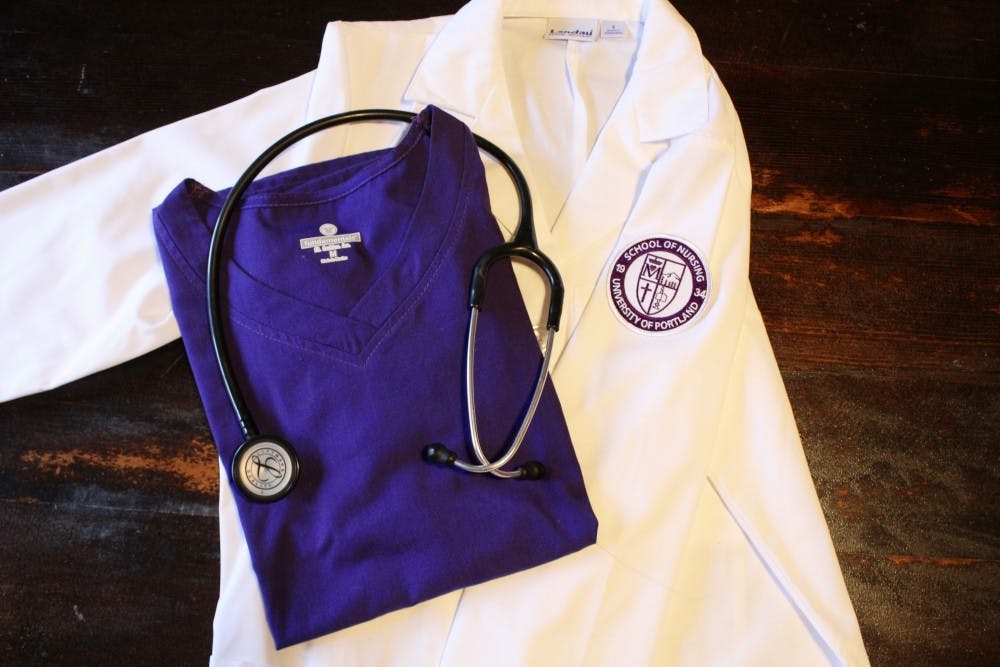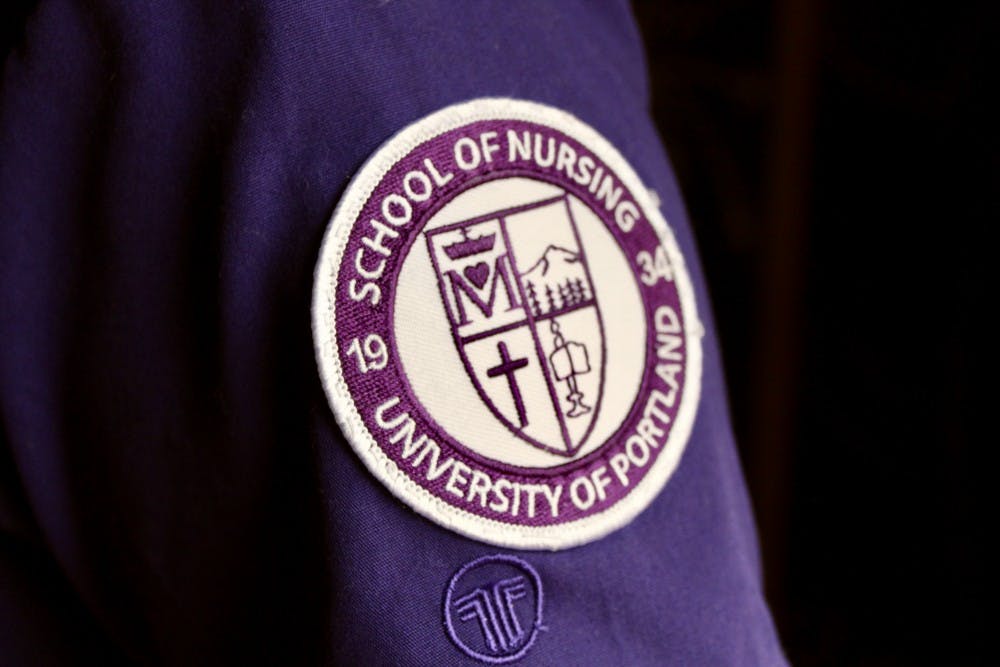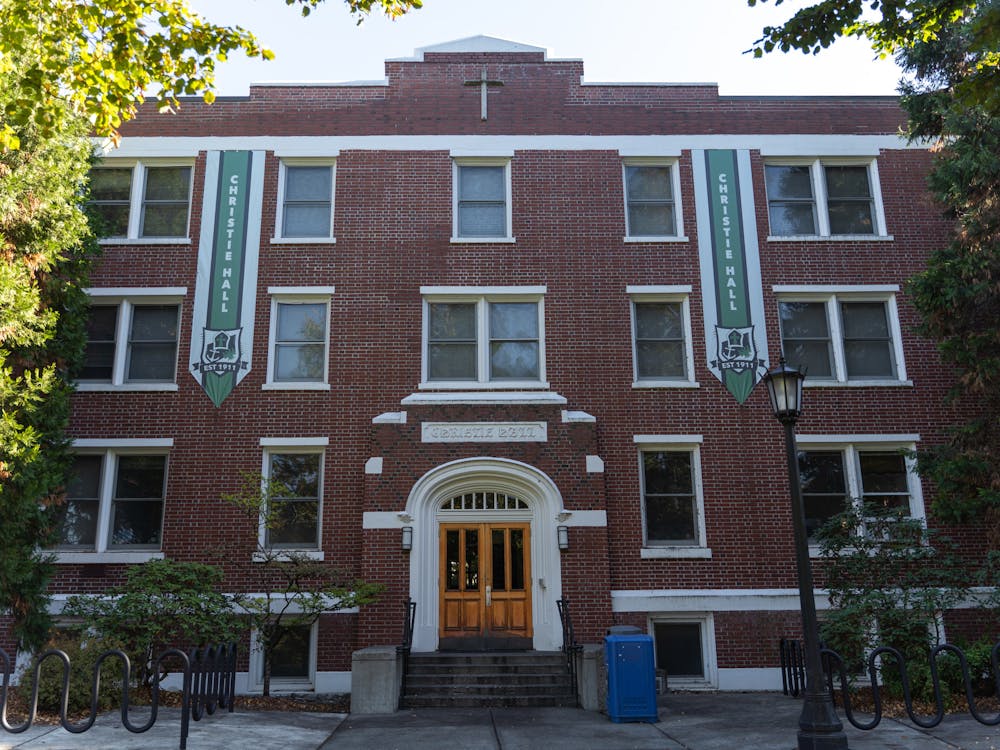As students hustle to class and the sound of the construction of Dundon-Berchtold Hall echoes across campus, big changes are happening in the School of Nursing.
Besides adding a new bachelor of science degree in Integrative Health and Wellness Studies in November, the school is also revamping its curriculum. This new approach emphasizes critical thinking skills over rote memorization of facts. It also eliminates the previous requirement for junior nurses to undergo a summer session, makes more use of the school’s Simulated Health Center and gives students more flexibility to pursue a minor.
Dean of the School of Nursing Casey Shillam said the changes reflect a nationwide response in nursing education to the rapid changes in healthcare. Medical knowledge has been growing at such a rate that it’s impossible for students to memorize the volume of information while also learning to think like a nurse. The new curriculum prioritizes teaching clinical reasoning — a skill nurses employ when assessing a patient and determining what’s wrong with them — interprofessional communication and empathy in caring for the vulnerable.
Changes to the curriculum began in 2015 when the former dean, Joane Moceri — who retired in at the end of the summer in 2018 after being diagnosed with kidney cancer — and faculty realized they needed to better prepare students to adapt to ongoing rapid changes in the nursing field. This year’s freshmen, the class of 2022, will be the first class to experience this new curriculum in full.

New features of the curriculum
Some of the changes include increasing simulation experience to up to 50 percent of clinical practice hours, which Shillam said is a change in line with the results of a recent study by the National Council of State Boards of Nursing. This summer, the second phase of the simulation lab remodel will involve the creation of a primary health care clinic, a space for a home healthcare simulation.
Senior nursing student Michael Paino said hands-on experience in the lab will help students apply their textbook knowledge to reality.
“I’d say the hardest part of learning medical things (is that) you go through all these topics and concepts and you learn all of this stuff, and you don’t really have a physical way of visualizing it unless you have a patient in the room,” Paino said. “So, the fact that they’re trying to make it more physical rather than just having to memorize all these concepts and understand it without having the practice going into it, I think that’s great.”
The new approach also aims to keep nursing students on the same schedule as most other university courses. Whereas the previous curriculum included three-hour courses and often two consecutive days of clinical practice, the new curriculum for the most part keeps students on the normal Monday, Wednesday, Friday and Tuesday, Thursday schedule that most other university core classes follow. Shillam said this schedule change will now make it easier for nursing students to take on a minor.
The new curriculum will also not require junior nursing students to enroll in an extra summer session of classes, a previous requirement of the old curriculum, reducing costs and allowing students the freedom to do things such as internships during the summer.
How does this impact current nursing students?
While this year’s freshmen will be the first to experience the entire new curriculum, current sophomores will experience the new upper division nursing classes as the school phases out the old curriculum. Part of this process involves not accepting transfer students until 2021 to allow time for the old curriculum to be taught out and replaced by the new.
When freshman nursing student Brendan Buchholz first heard about the changes, he was a little unsettled. He said he wasn’t sure about entering the nursing program in the middle of it being reworked. But once he arrived at UP and started taking the new classes, his feelings changed.
“I realized, okay, so they’re teaching us how to be a professional person, you know, like a professional in the real world instead of just knowing medical stuff,” Buchholz said. “They want to move us into the future because we’re going into a time of new technology and all this other stuff. Things are going to be thrown at us that we don’t necessarily know how to handle. But with this new curriculum, they want to teach us how to handle those situations.”
Changes reflect the future of nursing
Shillam said that a lot of the rethinking surrounding the curriculum reflects a broader realization of how nursing is changing as a profession. She mentioned a recent report by the Oregon Center for Nursing that found that only 55 percent of Oregon nurses actually work in hospitals. Nursing practice is also shifting to focus more on preventative medicine and health promotion, which helps to create healthy communities. Shillam said these changes in nursing philosophy are reflected in the new curriculum.
Despite the difficulty of transition, Shillam said she is confident that faculty have worked to create a curriculum that will offer students the best nursing training possible.
“It’s been really remarkable,” Shillam said. “As we got into this process, we didn’t know what the best step was. There’s a lot of different kinds of programs that are out there or different kinds of curricula. We just dove in and started going to conferences and reading the literature and talking to experts and really did this wide net, open thought of ‘what’s there and where should we go?’ And the great thing about that is that we have created truly this state of the art curriculum that is unlike anything else in the country because we have taken best practice in every area of nursing education.”
Wes Cruse is a reporter for The Beacon. He can be reached at cruse20@up.edu.








